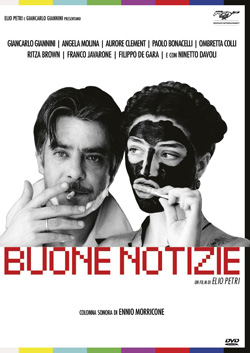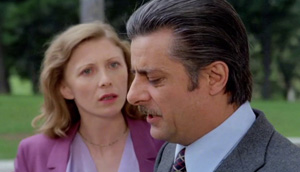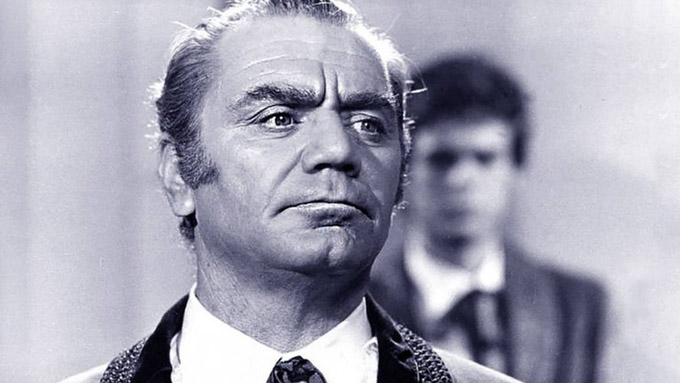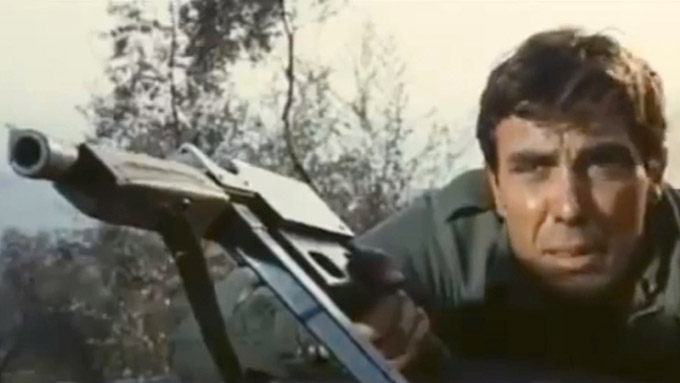Aka Buone notizie (It)
Italy
1979
Produced by Elio Petri and Giancarlo Giannini for Medusa Distribuzione
Director: Elio Petri
Story & screenplay: Elio Petri
Cinematography: Tonino Nardi {Eastmancolour}
Music: Ennio Morricone
Editor: Ruggero Mastroianni
Art director: Amedeo Fago, Franco Velchi Pellechia
Cameraman: Ubaldo Terzano
Release dates & running times: Italy (22/11/79, 107 mins)
Filmed: Incir-De Paolis Studios
Italian takings: 379.000.000
Cast: Giancarlo Giannini (the man), Paolo Bonacelli (Gualtiero Milano), Angela Molina (Fedora), Aurore Clément (Ada Milano), Ombretta Colli (‘Tignetti’), Ninetto Davoli (office porter), Ritza Brown (Benedetta), Franco Javarone (a police commissioner), Filippo De Gara (the syndicate representative), Giovanni Baghino.

After an adaptation of Sartre’s Dirty Hands (La mani sporche) for TV in 1978, Petri made his last film the following year. Good News was another science fiction film, although anyone expecting more of the out-and-out freakiness that so informed Todo modo is likely to be surprised. It’s actually a small scale, almost intimate, film that concentrates upon the relationships of the central characters. As such it could possibly be described as a more adult work; it deals with real emotions rather than abstract concepts or ideals. It is certainly far more approachable than anything he had produced during the previous decade, although in some ways that does act to its detriment.
It is also instructive for a couple of other reasons. For one thing, the humour is much more explicit than had previously been the case. Petri’s films are generally funny, even the bleak stuff such as The Working Class Goes to Heaven, but this really becomes clear when you see him tackling a virtually ‘straight’ – albeit left-of-centre – comedy. For another thing, the suspicion that he tends to drop intangible elements into his films for aesthetic, as much as philosophical, reasons seems to be strengthened here. There is absolutely no explanation given for the strange dystopia that is the future here, it is merely a backdrop which has no message, but appeals to the director’s Dadaist sensibilities. The parallels with the work of JG Ballard – in which tormented people engage in fractious, obsessional liaisons in topsy-turvy environments – comes to mind.
‘The man’ (Giancarlo Giannini) has a job for RAI (the Italian television network) that involves watching the news in a room full of televisions all day (the ‘news’ in fact being largely clips from Mondo Movies and Prisoners of the Cannibal God!) Society seems to be breaking down: the screens show a succession of riots, murders, epidemics and car crashes. The only interruptions are frequent bomb scares that cause everyone to scurry off to the park, romp, shag, play football and pick their way among the litter and corpses that seem to be everywhere.
Furthermore, his home life is a mess. He continually argues with his wife, Fedora (Angela Molina), and not only because she’s named after a type of hat. Their relationship seems to have ossified. He is crude and shallow, swears a lot and lusts after her friends and his workmates. She pedals frantically on her exercise bike.
Into this depressing existence comes Gualtiero (Paolo Bonacelli), an old school chum who he hasn’t seen for fifteen years. Gualtiero claims that he is being hunted down by a group of unknown people who are planning to kill him for some unclear reason. He also insists that ‘the man’ is his best friend, something that would make any reasonable person run a mile. The man isn’t reasonable, though, and despite suspecting that his ‘friend’ is a paranoid nutter he becomes increasingly involved with his delusions; not least because he fancies Gualtiero’s nymphomaniac wife, Ada (Aurora Clement). Of course, murder isn’t too far away.
Despite the serious sounding synopsis, this is a very light-hearted affair that completely plays down the murder mystery side of things. At times (not least the sequence which finds Giannini playing hide and seek with his topless wife and her equally topless female friend) it comes across as a standard lowbrow comedy. The comic interplay and dialogue, especially between Giannini (a macho, insecure man with a fear of dying) and Molina (a confident, apparently self-possessed woman), is very well done indeed. Bonacelli gives a winning performance, as does Franco Javarone as a laconic, sarcastic police inspector. Pasolini favourite Ninetto Davoli turns up briefly, sporting a frankly shocking Kevin Keegan hairdo.

Of course, it wouldn’t be a Petri film without a small quota of deranged touches. These include the aforementioned rubbish that’s absolutely everywhere, the strangest park known to mankind (Hampstead Heath on acid) and Ada’s predilection for singing ‘Frere Jacques’ when she makes love. There’s also an ending that comes straight out of leftfield and acts as a veritable flicked finger to anyone who may have thought that the director was getting sensible in his old age.
There’s also one or two of those jaw-droppingly well composed moments that you come to expect from Petri. The scene in which a demented Bonacelli forces Giannini to waltz around his room whilst the curtains blow and the sun sets is extremely striking, and probably as memorable as anything to come from this eminent director’s canon.
Unfortunately, Good News proved to be Petri’s last film: he died of cancer in 1982, at the age of just 53. Despite many of his films being successful upon initial release, his work seemed to fall out of fashion in the 80s, with very little of it receiving any kind of proper release on video. This is a shame as, although very much of their time, his films are of sufficient quality and entertainment value to easily stand up to repeated viewing today. In recent years, however, there have been some attempts at re-evaluation, with Petri seasons playing restored prints of his films in rep theatres around the world. Hopefully, some enterprising distributor will take the initiative of putting the likes of Investigation of a Citizen Above Suspicion, Todo modo and We Still Kill the Old Way out on DVD, where they can hopefully be discovered by a whole new generation of viewers.

